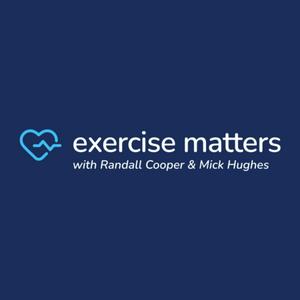39 episodes
- Are Super Shoes Hype or Performance Breakthrough?
Discover the truth behind the buzz around super shoes—do they genuinely enhance running performance or are they just industry hype? Join Randall Cooper, Mick Hughes, and special guest Kim Herbert-Losier as they unpack the latest research, biomechanics, and practical insights into high-tech running footwear.
In this episode:
The origins and key features of super shoes, including Nike’s Vaporfly and others
How super shoes potentially improve running economy with up to 87% energy return
Variability in individual responses—why some runners benefit more than others
The impact of biomechanics, foot strike, and gender on super shoe effectiveness
Psychological effects: perception vs. reality in performance enhancement
The role of super shoes in injury prevention and risk management
Practical advice on integrating super shoes into training and race strategies
Industry regulations and environmental considerations
Timestamps:
00:00 – Introduction to the episode’s focus on super shoes’ hype vs. reality
02:56 – Mick’s personal experience with running and calf injuries
06:52 – The influence of allostatic load and stress on performance
12:14 – What are super shoes and their technological features
16:35 – Research evidence on how super shoes improve running economy
20:58 – Variability in responses among different runners
24:21 – Comparing elite versus recreational responders in studies
27:04 – Quantifying performance benefits (~3-4%) from studies and anecdotes
30:19 – Factors influencing individual response, biomechanics, and shoe adaptation
34:24 – The placebo/perception effect and psychological aspects
37:05 – Regulations on super shoes by World Athletics
39:32 – Potential injury risks and research on injury rates
45:56 – Practical recommendations for safely integrating super shoes into training
50:53 – The importance of body adaptation and training in conjunction with footwear
55:42 – Final takeaways: variability, realistic expectations, and the role of super shoes as tools
Summary:
This episode offers a balanced view of super shoes—covering biomechanics, research findings, user variability, injury considerations, and practical integration tips. Whether you're a serious runner, coach, or physio, gain insights on making informed decisions about high-tech footwear and setting realistic expectations for performance improvements.
Resources & Links:
www.learn.physio – Evidence-based courses for health professionals
Premax Performance Skincare - Summary
In this episode of Exercise Matters, Randall Cooper and Mick Hughes discuss the intricacies of training for long-distance running. They explore the importance of consistency, the physiological determinants of performance, and the role of strength training in injury prevention. The conversation also delves into monitoring training loads and the significance of durability in running. With insights from elite athlete David McNeil, the episode provides valuable tips for both recreational and competitive runners looking to improve their performance.
Takeaways
The long run is crucial for marathon training.
Consistency in training leads to better performance.
Strength training is essential for injury prevention.
Monitoring training loads can help prevent injuries.
Physiological durability is key for long-distance runners.
VO2 max, lactate threshold, and running economy are all important.
Change one variable at a time in training.
The more kilometers you run, the faster you will be.
Heavy strength training can improve running economy.
Find the maximum amount of work you can repeat consistently.
Titles
Mastering Long-Distance Running
The Science of Running Faster
Sound bites
"Keep your skin as fit as your body."
"The long run becomes more important."
"Change one thing at a time in training."
Chapters
00:00 Introduction and Episode Overview
03:48 The Importance of Footwear in Running
05:36 Training for Distance Running
09:11 Physiological Determinants of Running Performance
13:51 Elite Habits for Everyday Runners
18:40 Consistency and Training Volume
20:19 Key Findings from Elite Runners' Training Study
22:49 The Role of Strength Training in Running Performance
26:54 Designing an Effective Strength Program for Runners
33:55 Understanding Physiological Durability in Endurance Training
38:03 Injury Prevention Strategies for Runners
Resources & Links:
www.learn.physio – Evidence-based courses for health professionals
Premax Performance Skincare - Summary
In this episode of Exercise Matters, hosts Randall Cooper and Mick Hughes delve into the intricacies of running mechanics, particularly focusing on foot strike patterns. They discuss common misconceptions about heel striking versus forefoot striking, emphasising that while many runners naturally heel strike, this does not inherently lead to injuries. The conversation highlights insights from Professor Irene Davis, a leading expert in running biomechanics, who explains the impact of different foot strike patterns on injury risk and performance. The hosts also touch on the importance of gradual adaptation when transitioning between different running styles and the role of footwear in this process.
Throughout the episode, Randall and Mick share their personal experiences with running, including the challenges of changing foot-strike patterns and the importance of understanding one’s biomechanics. They stress that while some runners may benefit from shifting to a forefoot strike, it is crucial to approach such changes carefully to avoid injury. The episode wraps up with practical advice for runners and clinicians alike, encouraging a thoughtful approach to running mechanics and injury prevention.
Takeaways
'Running is an activity that many people do, but the mechanics can vary significantly.'
'Most people naturally adopt a heel strike pattern, especially in long-distance running.'
'Transitioning to a forefoot strike requires careful adaptation to avoid injuries.'
'Ground contact time is a critical factor in injury risk.'
'It's essential to progress slowly when changing running styles or footwear.'
Chapters
00:00 Introduction to Exercise Matters
01:00 Recap of Previous Episode and Personal Running Experiences
04:01 Introduction to Foot Strike Patterns
09:46 Insights from Professor Irene Davis
18:11 The Commonality of Heel Striking in Long-Distance Running
27:15 Ground Contact Time and Injury Risk
36:58 The Role of Footwear in Running Mechanics
42:13 Practical Advice for Runners and Clinicians
Instagram@exercise_matters - Summary:
In this episode of Exercise Matters, hosts Randall Cooper and Mick Hughes discuss the importance of a food-first approach to performance nutrition with guest Lisa Middleton, a seasoned sports dietitian. They explore the benefits of obtaining nutrients from whole foods before considering supplements, emphasising planning and consistency in dietary habits. The conversation also touches on the roles of supplements like creatine and vitamin D, as well as the significance of personalised nutrition strategies for athletes.
Takeaways:
Prioritise whole foods for nutrients before supplements.
Supplements offer marginal gains compared to food and training.
Most athletes don't need supplements if diet is adequate.
Only a few supplements have strong evidence of benefits.
Medical supplements should be evidence-driven.
Food-first is a risk management strategy for athletes.
Plan meals to ensure nutritional needs are met.
Creatine and vitamin D may require supplementation in specific cases.
Personalised nutrition strategies enhance performance.
Consistency in diet beats perfection.
Chapters:
00:00:00 Introduction to Food-First Nutrition
00:00:00 The Role of Supplements
00:00:00 Planning and Consistency in Diet
00:00:00 Personalised Nutrition Strategies
00:00:01 Conclusion and Key Takeaways
Instagram@exercise_matters - Summary
In this episode of Exercise Matters, hosts Randall Cooper and Mick Hughes discuss the ongoing debate between free weights and machines in resistance training. They explore the myths surrounding both methods, the importance of evidence-based practices, and the role of resistance training in different populations, particularly older adults. The conversation emphasises the need for personalised training approaches and the significance of consistency in achieving fitness goals.
Takeaways
Free weights and machines both have their benefits.
Safety is a key consideration in choosing training methods.
Older adults can significantly benefit from machine-based training.
Consistency in training is crucial for strength and hypertrophy.
Understanding the basics of resistance training is essential.
Myths about free weights being superior are challenged by evidence.
Training should be tailored to individual goals and needs.
Both methods can lead to significant strength gains.
Embracing a mix of training methods can be beneficial.
The conversation highlights the importance of evidence-based discussions in fitness.
Chapters
00:00 Introduction and Holiday Greetings
02:50 The Importance of Resistance Training
05:31 Free Weights vs. Machine Weights
08:07 Understanding Resistance Training Basics
10:55 Common Myths in Resistance Training
13:35 Evidence on Strength and Hypertrophy
16:08 The Role of Machines in Older Adults
18:53 Gender Differences in Resistance Training
21:33 Practical Recommendations for Resistance Training
24:27 Wrapping Up and Key Takeaways
Instagram@exercise_matters
More Health & Wellness podcasts
Trending Health & Wellness podcasts
About Exercise Matters
Exercise Matters is your go-to podcast for evidence-based insights into training, exercise, and performance. Hosted by sports physiotherapists Randall Cooper and Mick Hughes, we break down the science behind strength, injury prevention, and athletic success. Whether you're an athlete, coach, or health professional, tune in for myth-busting and practical strategies to level up your game.
Train smarter. Exercise better. Perform stronger.
Podcast websiteListen to Exercise Matters, Get Sleepy: Sleep meditation and stories and many other podcasts from around the world with the radio.net app

Get the free radio.net app
- Stations and podcasts to bookmark
- Stream via Wi-Fi or Bluetooth
- Supports Carplay & Android Auto
- Many other app features
Get the free radio.net app
- Stations and podcasts to bookmark
- Stream via Wi-Fi or Bluetooth
- Supports Carplay & Android Auto
- Many other app features


Exercise Matters
Scan code,
download the app,
start listening.
download the app,
start listening.






























